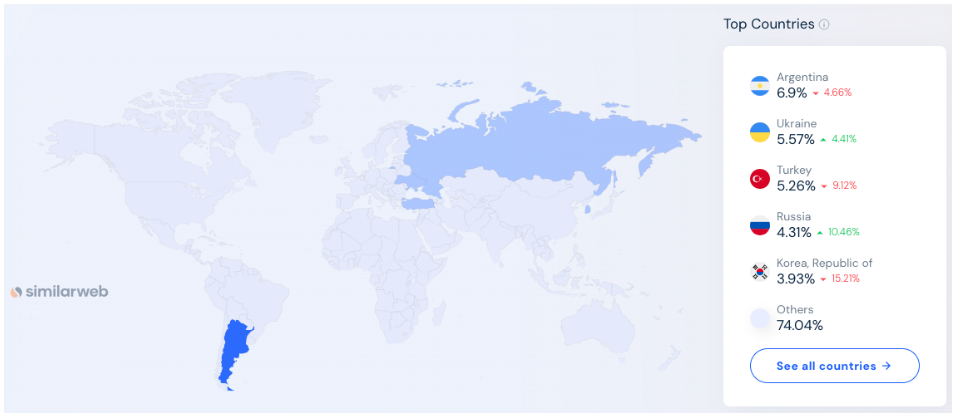Argentina became a leading market for cryptocurrency adoption as the country faces a big increase in inflation.
When money dies
Cryptocurrency usage in Argentina reached new heights, likely driven by an annual inflation rate of 276%.
According to Forbes, Argentina leads the Western hemisphere in crypto adoption, as out of 130 million visitors to 55 of the world’s largest crypto exchanges, 2.5 million came from Argentina, based on Similarweb data. That’s a pretty impressive citizen/crypto user rate.

Argentina is the top market for Binance, one of the biggest crypto exchanges globally, because data from Similarweb shows that traffic from Argentina makes up 6.9% of Binance’s total visits.
And they aren’t degen speculators, jumping to the bandwagon of memecoin trends, but using crypto as lifeline, as everyday currency. Argentines prefer holding stablecoins like USDT.
Real users
The adoption of crypto isn’t driven by memecoins, but locals choose to hold stablecoins like Tether, which maintain, or compared to the Argentinian peso, maintain a stable value by pegging to the US dollar.
Maximiliano Hinz, Bitget’s head of Latin America, told that many Argentines buy USDT and simply hold it, unlike in other markets.
Physical dollar bills are relatively rare on the streets, so exchanging their salary to stablecoins, and holding digital USDT makes sense for Argentines facing high inflation, even though the country lacks measures to protect stablecoin investors.
Steady, but slow
Despite Argentina’s friendly stance on cryptocurrencies, the country struggles to regulate the industry effectively.
In late 2023, after President Javier Milei took office, Argentina officially allowed Bitcoin in legally binding contracts.
Since then, efforts to regulate the local crypto market have included registration requirements for crypto firms in April 2024. Not much progress, but it started.
Yet, Argentina had difficulty providing regulated crypto services to its population. Forbes reported that none of Argentina’s top crypto exchanges, not even Binance, have registered with the national securities regulator, Comisión Nacional de Valores.
But Bitget’s Hinz stated that, this isn’t a weird thing as there is no licensing requirement in the Latin American countries where Bitget operates.
Have you read it yet? Messari CEO put the SEC in its place
Disclosure:This article does not contain investment advice or recommendations. Every investment and trading move involves risk, and readers should conduct their own research when making a decision.
Kriptoworld.com accepts no liability for any errors in the articles or for any financial loss resulting from incorrect information.


